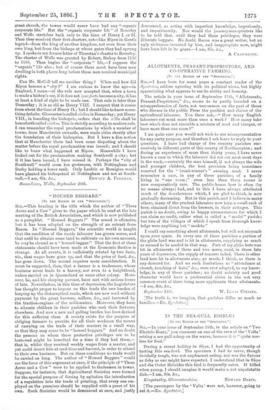"HOUSED BEGGARS."
[To THE EDITOR OF THE " SPECTATOR:1 • Sin,—This heading is the title which the author of "Three Acres and a Cow" gives to the paper which he read at the late meeting of the British Association, and which is now published .as a pamphlet. "Housed Beggars !" The sound is offensive, but it has been adopted on the strength of an extract from Bacon. In "Housed Beggars," the scientific world is taught that the condition of the rustic labourer has grown worse, and that until he obtains some land to cultivate on his own account, he may be classed as a housed beggar." That the first of these statements should have been made at the Economic Section is strange. At all events, it is sufficiently refuted by two facts, viz., that wages have gone up, and that the price of food, &c., has gone down. The second requires more consideration. It must be suggested, then, that a farmer is a tradesman, whose business never leads to a barony, nor even to a knighthood, unless carried on in Queensland or some other colony. More- over, he, and his sleeping partner, have met with serious losses of late. Nevertheless, in this time of depression, the Legislature has thought proper to impose on this trade the new burden of keeping up the disturnpiked roads, which are now used without payment by the great brewers, millers, &c., and farrowed by the traction-engines of the millionaires. Moreover, they have to educate children in their parishes who seek their fortunes elsewhere. And now a new and galling burden has been devised for this suffering class. A society exists for the purpose of obliging farmers to provide for all their workmen the means of carrying on the trade of their masters in a small way, so that they may cease to be "housed beggars." And no doubt the persons on whom these protective privileges are to be bestowed might be benefited for a time if they had them,— that is, whilst they received weekly wages from a master, and yet could desert him at seed-time and harvest, in order to attend to their own business. But on these conditions no trade would be carried on long. The author of "Housed Beggars" would see the force of this argument at once, if the principle of "Three Acres and a Cow" were to be applied to tradesmen in towns. Suppose, for instance, that Agricultural Societies were formed for the special purpose of forcing by agitation the introduction of _a regulation into the trade of printing, that every one em- ployed on the premises should be supplied with a press of his own. Such Societies would be denounced at once, and justly denounced, as acting with imperfect knowledge, imperiously, and impertinently. Nor would the journeyman-printers like to be told that, until they had these privileges, they were illiterate beggars. No doubt Bacon was a great writer, but an ugly nickname invented by him, and inappropiate now, might have been left in its grave.—I am, Sir, &c.,
A CUIWBACON.


































 Previous page
Previous page